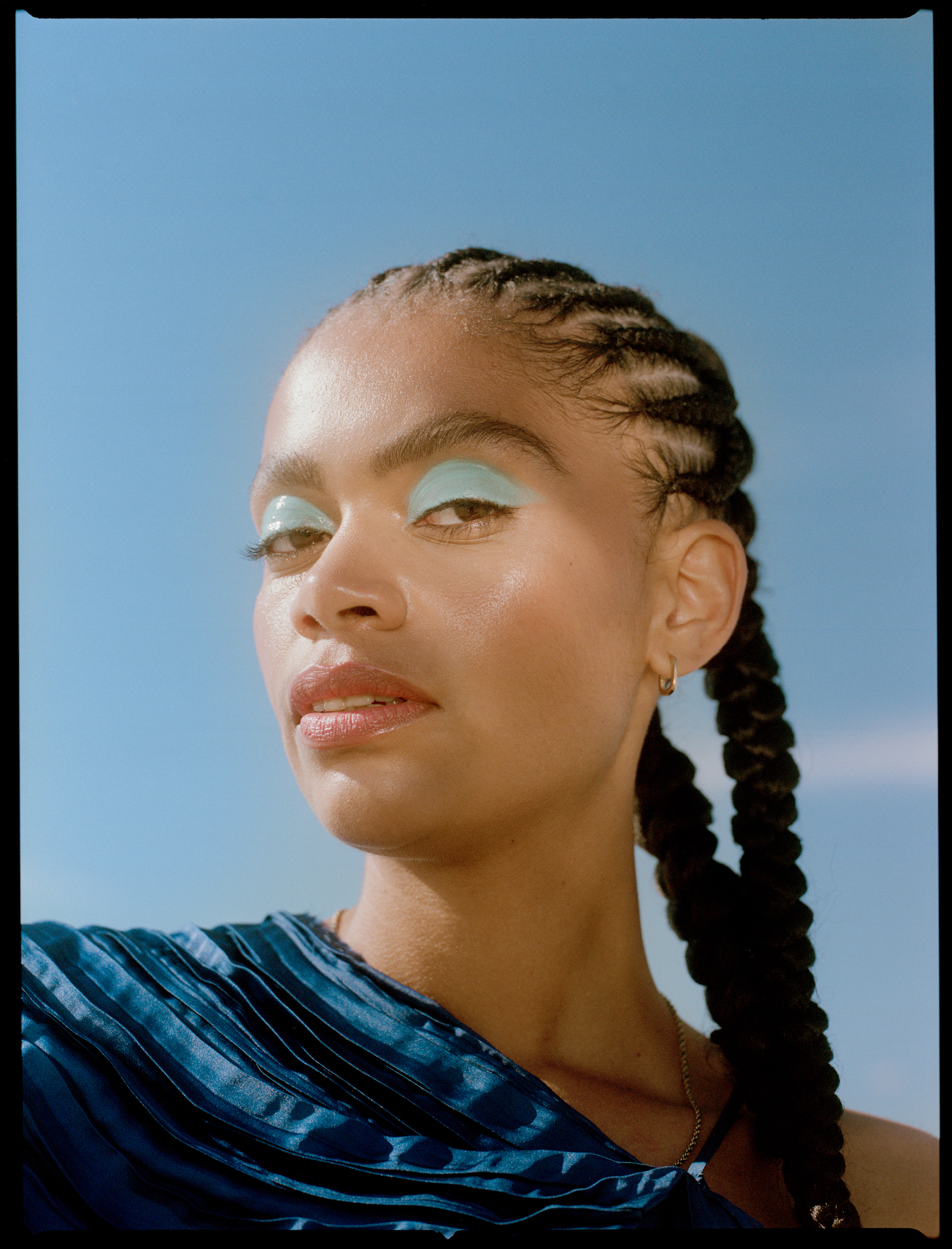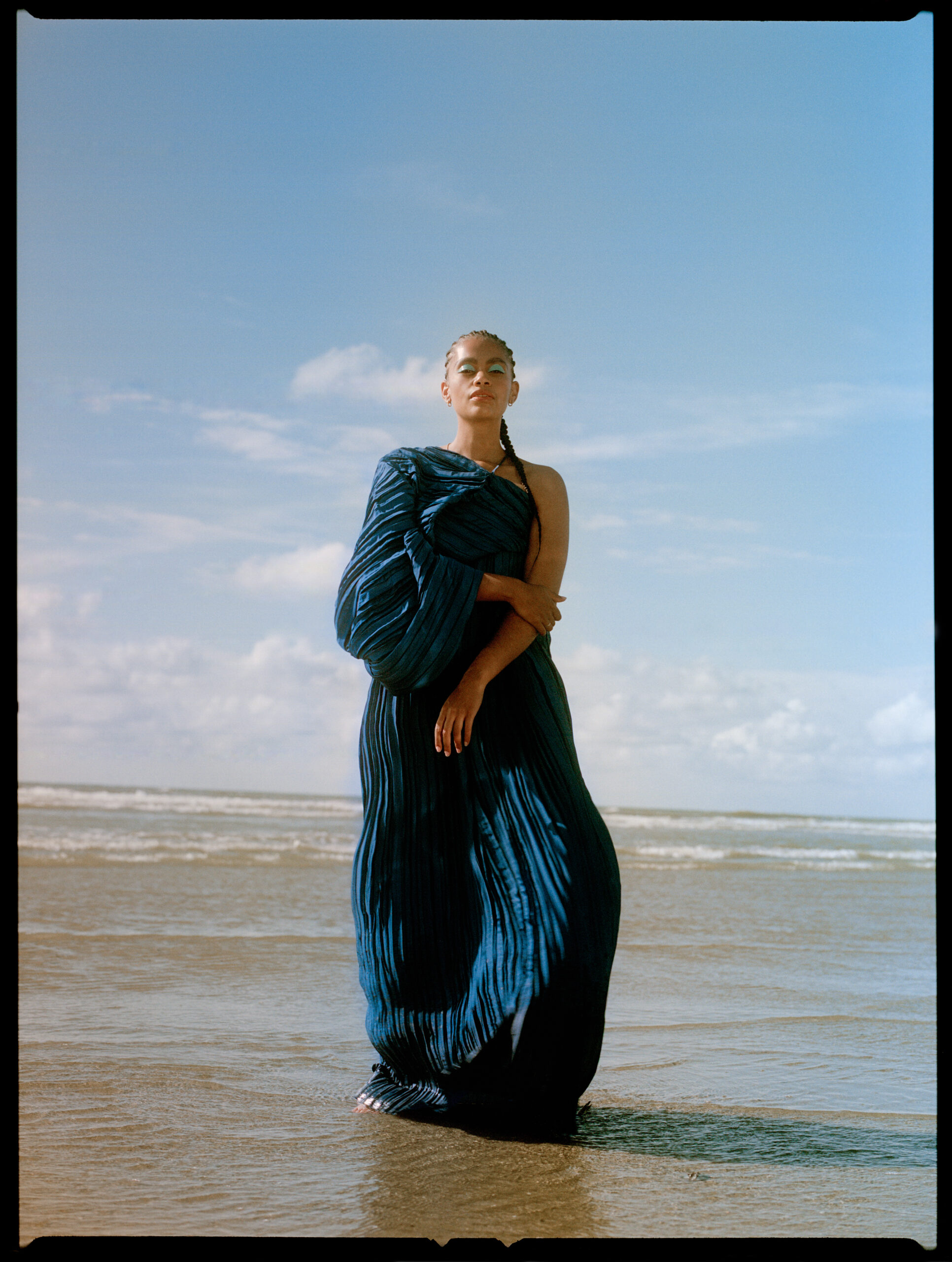Politics meet spirituality under an enticing musical charm

Free-flowing RnB with intent and freedom is the foundation of Joya Mooi’s multi-layered musical practice. Her latest album What’s Around the Corner is a slow-burning exploration of the personal and the societal, spanning over 15 tracks each probing a different aspect of our individual and global identity. Laying her thoughts bare scattered over a rich sonic palette, Mooi’s profound body of work reads like a warm touch to the soul and a push towards the right direction. In light of the release and the premiere of There is Too Much of You music video, we spoke to the Amsterdam-based musician about change in society, activism and her process.
Hey! How are you doing?
I’m very well thank you!
Congratulations on the release of What’s Around the Corner! Could you tell me more about the project?
During the pandemic, I was a bit confused and frustrated – I wanted to make music, but it was hard to get to the studio. I started writing at home, just about the feelings I was having. Once I had two demos in, I came across this social psychotheory theory that looks at how society changes over time. It’s something I’ve thought about a lot within what I talk about – identity, spirituality, politics. There are a lot of things that are fucked up in the world. This theory was a way to have a frame I could depart from. When I was writing No Beginning, which is the start of side B, I was thinking, if there is actually a new beginning. We always hear ‘new year new me’. Is it true? Can you start completely over? Sometimes you are floored with what happens to you, and it’s not always a deliberate.
Side A of the album came out back in September. How come you decided to split the album and give space before the release of Side B?
The first part is more of an exploration. At first, I thought side B was going to be a resolution, but it turned out to be filled with more confusion and emotion. I don’t have a resolution yet, but it’s about me exploring and taking my feelings seriously. Splitting it bought me so much time to edit Side B, and also gave my listeners time to really dive into part A. I actually really liked this process of working – it allowed me to be very thorough.
Could you tell me a bit more about the process? I’ve read that the process of creating this record was what you were the most proud of…
I was so used to having limited resources. Because of the pandemic, I had all the time and freedom to just create. There were no deadlines or any restrictions. You can also hear that freedom in the way we mixed that record – there are a lot strings, but also drums. Half of the drums were recorded acoustically. I was able to be deliberate with every aspect. This made the story feel truly whole for me, and I’m very proud of that.
Let’s talk about Most Frail! I was fascinated by the story of your father that lies at the heart of the song.
My father was a freedom fighter, and he entered the Nelson Mandela party when he was 17. This song is a tribute for his generation who fought for equality in South Africa. Sadly, it’s still a struggle now. They’ve dealt with a lot of trauma then, and might not seem that proactive now. I’m not sure if I’m asking for more understanding, but the space of being misunderstood has not been explored much. The view in South Africa right now is to just look to the future, but I think in the past lie so many feelings that must be encountered at some point.
Both of your parents were activists. How would you say this affected your own artistry?
My mother was working as an activist and a doctor. When she was 23, she moved from the Netherlands to work in Angola and spread information about the situation there back home. Having them as parents was definitely interesting. It was difficult to see how they were still struggling and wanted a different outcome for both of the countries they were so passionate for. Because of them, I was really aware of politics and inequality from a young age, and also saw the toll activism takes on a person’s body and mental health.
As you merge spiritual and political in your work, would you say music can be a from of activism as well?
I’m not sure yet. It’s a form of it, but I’m used to seeing activism in such a different expression, that I’m not sure if mine counts. The themes I explore and being a Black woman in music is already quite enough, along with spreading awareness about the things I care about. Social awareness is a fundamental part of me, not just my music.
I guess it depends on how you choose to define activism for yourself. Oftentimes, simply existing is powerful enough already.
Exactly.
And sonically, what are some of your influences?
I’ve always really liked music that was out there, that speaks something. Not only in an emotional or political way, but in sound as well. I like music that makes me feel alive or mad or happy. My main inspiration is listening to music that has urgency. I’ve always loved fine arts and books, and narratives that are triggering. Sometimes, I can read book and base a song off the main character. I’m always drawn to anything that evokes a feeling.
Your visuals also always translate a strong feeling and narration. What is the role of visual language in your musical expression?
Visuals play a huge role, but the narrative is always the leading point. We shot Tears in Cape Town, and the process was very intuitive. The song is about failures and celebrating failures, so the idea was to shoot whatever comes naturally.
I love the lyric High maintenance / Share the stage leading / Entities extending grace. Talk me through your process of songwriting…
This song is about giving into not knowing. In my life, I’ve always practiced spirituality a lot. I never believed in a god, but I’ve always believed in something. I really gravitate towards centring my spirituality. When it comes to songwriting, I try to be present in the moment and not overthink it. Sometimes, it takes me time to understand myself. There’s often more truth and freedom to my words in my writing rather than when I’m talking about my feelings. I think my writing is the closest thing to my heart. Lyrics and melody come before the theme for me. I almost never know where I’m going in the beginning.
Now that the whole body of work is out, what have some of the most special responses been?
With creating, I’m always very honoured when people take time to listen to the whole project. Yesterday we had a get-together with most of the creators of the album, and it was very special. It’s been such a cool ride. I’ve been working on this for two years with such beautiful people. The reactions are great, but the thing I enjoy most is the fact that I created something I’m most proud of ever, and got to do it with such talented people.
What are you manifesting for 2023?
More travel and a bit more rest. Good health for everyone around me. New music of course, but it only comes after the balance with your body and mind.

Images courtesy of Joya Mooi
Words by Evita Shrestha
Notifications